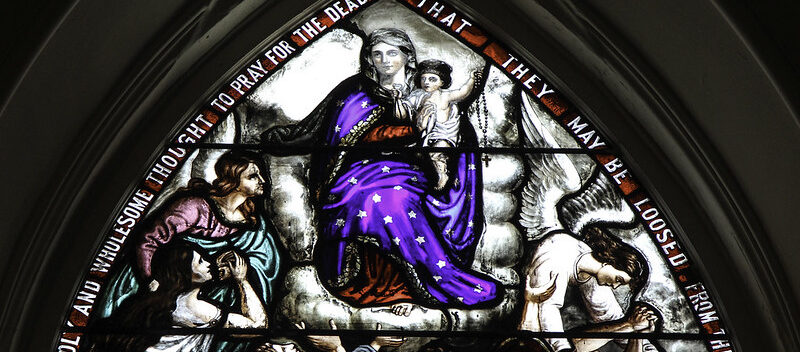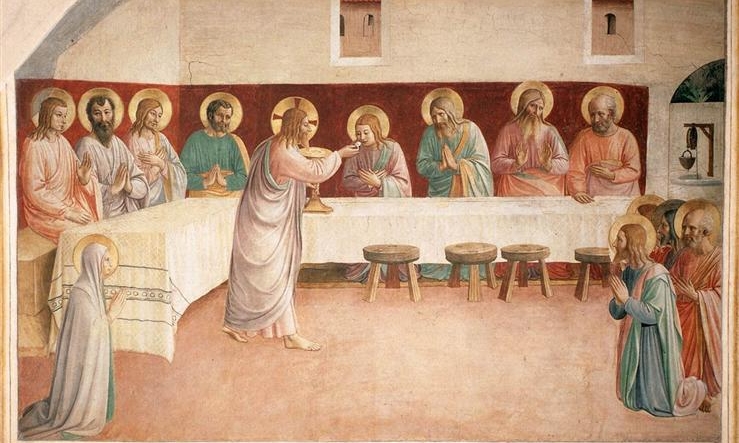Tag: Catholicism
Offering it up for Others

“Offer it up” is a phrase well-known to Catholics both young and old. It is a phrase that we often use to satirize stern teaching-sisters and good Catholic mothers alike. But, despite its worn familiarity, it is a phrase that has not yet lost its use! In Spe salvi Pope Benedict XVI said that “offering it up” is a way that “even the small inconveniences of daily life could acquire meaning and contribute to the economy of good and of human love” (Spe salvi, 40). Furthermore, he suggested that “maybe we should consider whether it might be judicious to revive this practice.” Especially during this month dedicated to the remembrance of the deceased, we can make an effort to offer up our suffering on behalf of those souls in Purgatory.
The reality of human suffering in a world ruled by “a God gracious and merciful, slow to anger and abounding in love and fidelity” (Exod 34:6) is a profound mystery. St. Thomas Aquinas writes that God’s allowance of suffering is part of God’s infinite goodness so that out of that suffering he can produce immense good (ST I, q. 2, a. 3). From blind beggars and sick servants to the crucifixion of Christ, the Gospel is filled with examples of Jesus transforming sickness and suffering into prosperity and joy. This transformation is also possible in our lives. When we realize that God permitting our suffering is a part of his goodness, we are able to sanctify it by “offering it up” to God.
When faced with suffering, we can do one of two things. We can reject that our pain has any meaning or purpose, or we can offer up our daily struggles. By offering it up, we accept our suffering and acknowledge that God can bring good out of it. Our suffering can open the door to our sanctification. When we offer up these moments, we hand them over to God, and he transforms them into acts of love. “Offering it up” can be as simple as praying:
Dear Lord, I offer you my suffering today
For the conversion of sinners,
For the forgiveness of sins, and
For the salvation of souls. Amen.
All suffering, from mild discomfort to profound miseries, can be offered to God. When I was a child, my parents told me to “offer up” small paper cuts, childhood disappointments, lack of desserts, and other seemingly inconsequential discomforts. Even with small struggles like these, God can produce substantial good because, in them, we find an opportunity to unite ourselves to Christ’s suffering. By accepting our suffering, we take up our crosses, where “Christ’s sufferings overflow to us” (2 Cor 1:5). By handing over our suffering to Christ, we join ourselves to the suffering he endured for us, “sharing of his sufferings by being conformed to his death” (Phil 3:10). It is by joining ourselves to Christ’s suffering that we can make expiation for our own sins and more perfectly conform ourselves to God’s will.
In addition to being sanctified ourselves, we can offer our suffering for the sanctification of others—especially for those in Purgatory. The souls in Purgatory cannot help themselves; they rely on our prayers for relief. (ST II-II, q. 83, a. 11) We can and should always pray for them. By turning to prayer during moments of suffering, joining ourselves to Christ’s cross, and offering our sufferings for the souls in Purgatory, we can say with St. Paul, “I rejoice in my sufferings for your sake, and in my flesh I am filling up what is lacking in the afflictions of Christ on behalf of his body, which is the church” (Col 1:24).
Image: Photo by Fr. Lawrence Lew, O.P. (used with permission)
Originally posted on Dominicana Journal
Spiritual Hunger

At a convent of the Missionaries of Charity, my mother once made twelve bags of food to give to the homeless. She and the sisters then went to one of their usual spots in my hometown to hand out the bags of food, where there were never more than twelve people. However, upon arrival my mother discovered that there were, not twelve, but thirty-six homeless. Panicking, she told one of the sisters that they should go to another spot because there would not be enough bags of food for the crowd. The sister replied that my mother should start praying the Memorare prayer. So the sisters and my mother gathered the homeless together, prayed with them, and my mother proceeded to hand out the bags of food. When the last bag was handed out, everyone had a bag in their hands.
This happened when I was a child, and because of it, the Gospel story of the Feeding of the Five Thousand has always struck a special cord in my heart. This story also seems to have hit a special cord with the Gospel writers as well, given that it is the only miracle that is recounted in all four Gospels (Matt 14:13-21, Mark 6:34-44, Luke 9:10-17, John 6: 1-14).
The evangelists knew the significance of this miracle story not only because the miracle itself shows the powerful and providential care of Jesus for his people, but also because of what Jesus is pointing towards in this miracle. This miracle points us to the Holy Sacrifice of the Mass, where Jesus’ sacrifice at Calvary is presented and where Jesus gives his Body and Blood to the Church as the healing food for our souls. In fact, the Book of Revelation even shows us that the same liturgy we celebrate in the Mass on earth is celebrated in Heaven. Each Mass, we should call to mind the communion of saints and angels all around us.
This all came together in the most beautiful way during one of my summer visits home. I was at mass right next to my mother. I watched as a packed congregation on a Saturday noon mass came up for communion. I couldn’t help but see us in the same light as the five thousand whom our Lord looked on with pity. Just as the five thousand were hungry for food, we were spiritually hungry for our Lord. As the apostles stood in the place of Jesus when they brought food to the five thousand, so the elderly priest stood in persona Christi as he slowly distributed the Eucharist from person to person along the communion rail.
Studying to be a priest of Jesus Christ, I can now see how, by reflecting on my mother’s miracle story, Jesus was using that event to point me to something higher. God will always look with pity on his children and will always provide priests of Jesus Christ to offer up the eternal sacrifice of Jesus for the sanctification of souls. Let us remember that every time we come to mass, we are entering into the sacrifice of Jesus for our sins and pray for a renewed spiritual hunger for Jesus in the Eucharist. Blessed are those called to the Supper of the Lamb.
Image: Fra Angelico, The Institution of the Eucharist
Originally posted on Dominicana Journal
